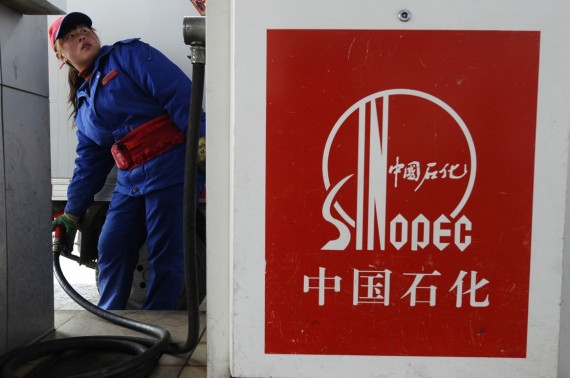Is China Eating Our Lunch?
March 7, 2011 11:28 pm (EST)
- Post
- Blog posts represent the views of CFR fellows and staff and not those of CFR, which takes no institutional positions.
More on:

My latest "DC Diary" column is out in India’s leading financial newspaper, the Business Standard. The column plays off a rather extraordinary back-and-forth from Hillary Clinton’s budget testimony last week.
The Secretary of State told Congress that China is not just competing with the United States around the world but, for all intents and purposes, is eating America’s lunch.
“Let’s just talk, you know, straight realpolitik,” Mrs. Clinton told the Senate Foreign Relations Committee. “We are in a competition with China. Take Papua New Guinea: huge energy find ... ExxonMobil is producing it. China is in there every day in every way, trying to figure out how it’s going to come in behind us, come under us.”
But how effective is the China model, anyway? And is China’s approach really quite so uniform?
This much is clear: China’s arrival as trader, investor, lender, and builder is dramatically changing the economic environment around the world because, while Chinese investors are not oblivious to the challenges of doing business in, say, Papua New Guinea or Niger, they have taken on risks where American and Japanese (and Indian) firms have not. Over the long term, China is likely to displace other, more traditional partners across an array of sectors.
Take Central Asia. Beijing has ended Russia’s near monopsony on Turkmen gas, established eastbound pipeline connections to China for Kazakh oil and Turkmen gas, and negotiated complex transit rights for the latter. But China is not simply eroding Russian economic leverage. It is, too, eroding the economic influence of indigenous elites with close ties to Russian industry while empowering a new stratum.
And Chinese preferential loans will, in time, erode the influence of nearly all other international lenders as well, especially the international financial institutions (IFIs).
Beijing’s loans of $10 billion for Kazakhstan, $4 billion for Turkmenistan, more than $603 million for Tajikistan, and a $10 billion loan facility to members of the Shanghai Cooperation Organization through China’s EximBank and other development banks have come without World Bank-style conditionality, although China employs its own forms of conditionality through “buy China” and “employ Chinese” provisions. So, while China is providing new options to Central Asian governments, it is also assuring new bargaining power that they can leverage in new ways with the IFIs, the U.S., and others.
But Chinese strategies are hardly uniform. Nor have they proved to be uniformly successful.
A recent study of China’s role in Africa, from my Eurasia Group colleagues, Philippe de Pontet, Michal Meidan, and Anne Fruhauf, shows why.
Resources for infrastructure deals have benefited Chinese construction, telecommunications, and hydropower companies. But Chinese oil and mining companies have failed to dominate Africa’s extractive industries. And significant infrastructure investments in mineral rich countries such as Gabon and Zambia secured Chinese firms entry into the market but not a preferential position.
My colleagues identified several reasons. One is technical: Chinese oil and gas companies are less technologically advanced than their Western counterparts in deepwater exploration, despite an impressive record in enhanced oil recovery. And Chinese mining companies lack the sophisticated technologies required for the capital-intensive mining of metals such as platinum.
Another reason is political. Chinese employment practices have produced a backlash in many countries. And that makes me wonder whether Chinese commercial engagement might not ultimately produce greater convergence with the US and others in rough, tough investment environments.
We mostly take for granted that Chinese companies can bear more risk, or that China’s government will underwrite the kind of risks that most other governments shy away from. But as China grows in reach, its economic incentive to revisit these practices may expand, not least to protect its own investments. Chinese companies no longer operate alone in many places. Its national oil companies are in (or seek) partnerships with international oil companies—first, to acquire technology; second, to share risks; and third, to connect to new skills and industry practices.
The Chinese even surprised their U.S. counterparts in a 2004 round of policy planning discussions by asking about the good governance provisions in then-President George W. Bush’s Millennium Challenge Account development fund. And more recently, as commodity prices have become more volatile, Chinese enterprises have become more concerned with the need for predictability in some of the countries in which they are investing.
Indeed, as my colleagues note, Chinese firms backed by state loans face growing constraints in countries that have increasingly stringent local content rules.
The bottom line is that there are limits to China’s approach. The weaker the state, the more appealing is China’s model of trading loans and infrastructure for resources. But the stronger the state, the more wary countries are likely to be of falling into a new pattern of dependence.
And that means that Chinese firms will be forced to compete with fewer advantages and more handicaps.
Mrs. Clinton is right that the U.S. needs to play (and stay) in the game. The business of Asia, in particular, is business. And without vigorous trade, investment, and strategic engagement, America’s position will fade in a changing Asia.
But neither should we presume that China is eating our lunch. As I argued through my column and on this blog in December, “we aren’t China.” And the U.S. (and, for example, India) has inherent strengths and comparative advantages that remain appealing around the world.
There is, of course, the power of private enterprise. And, increasingly, the U.S. and India, among others, share a commitment to entrepreneurship as a source of innovation and growth. That is something on which to capitalize.
More on:
 Online Store
Online Store